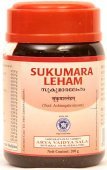Sukumara, Sukumāra, Sukumārā, Su-kumara: 28 definitions
Introduction:
Sukumara means something in Hinduism, Sanskrit, Buddhism, Pali, Marathi, Jainism, Prakrit, Hindi, biology. If you want to know the exact meaning, history, etymology or English translation of this term then check out the descriptions on this page. Add your comment or reference to a book if you want to contribute to this summary article.
Sukumara has 28 English definitions available.
Alternative spellings of this word include Sukumar.
Languages of India and abroad
Sanskrit dictionary
[Deutsch Wörterbuch]
Source: Cologne Digital Sanskrit Dictionaries: Böhtlingk and Roth Grosses Petersburger WörterbuchSukumāra (सुकुमार):—
1) adj. (f. ī) zart [Amarakoṣa 3, 2, 27.] [Hemacandra’s Abhidhānacintāmaṇi 1387.] [Anekārthasaṃgraha 4, 284.] [Medinīkoṣa r. 302.] [Hārāvalī 124.] Personen, insbes. Frauen [Mahābhārata 1, 5888. 5907] (compar.). [5949. 3, 2339. 4, 61. 75. 5, 6029.] [Rāmāyaṇa 2, 38, 4. 58, 7. 61, 4. 77, 14. 87, 3. 103, 37.] [Rāmāyaṇa Gorresio 2, 34, 14.] [Kathāsaritsāgara 85, 37] (compar.). [Bhāgavatapurāṇa 4, 23, 19. Śiva] [Śivanāmasahasra] Körper und Körpertheile [Vyutpatti oder Mahāvyutpatti 11.] [Mahābhārata 1, 5975. 3, 2147. 2394. 2505.] [Rāmāyaṇa 1, 9, 39. 47. 4, 52, 24.] [Mṛcchakaṭikā 153, 24.] [Bhāgavatapurāṇa 1, 19, 26. 5, 5, 31] (ati). Blatt [Spr. (II) 6872.] vacas [Rāmāyaṇa 2, 64, 30.] aniṣṭhurākṣaraprāyaṃ sukumāramiheṣyate [kāvyādarśa 1, 69.] sukumārākṣaraprāya [PRATĀPAR. 68,a,6.] gāyanti sukumārāṇi manojñāni [Rāmāyaṇa 1, 9, 48 (47 Gorresio).] buddhi [Sāhityadarpana 2, 5. 6.] paramasukumāro yaṃ śoṇitāvasecanopāyo bhihito jalaukasaḥ [Suśruta 1, 39, 15. fg.] prakṛteḥ sukumārataraṃ na kiṃcidasti zarter, fein fühlender [SĀṂKHYAK. 61.] st. jāti [Harivaṃśa 8460] liest die neuere Ausg. tha kumāra . —
2) m. a) Bez. verschiedener Pflanzen: = puṇḍrekṣu [Hemacandra’s Anekārthasaṃgraha] [Medinīkoṣa] = aśoka [Rājanirghaṇṭa 10, 60.] = kṣava [16, 66.] = śyāmāka 85. = priyaṅgu 89. = vanacampaka [Rājanirghaṇṭa im Śabdakalpadruma] — b) Nomen proprium α) eines Schlangendämons [Mahābhārata 1, 2150.] — β) eines Daitya [ŚABDĀRTHAK.] bei [WILSON.] — γ) eines Fürsten [Mahābhārata 1, 6990. 2, 1069.] Sohnes des Ānarta (Suvibhu, Vibhu) und Vaters des Dhṛṣṭaketu [Harivaṃśa 1595. 1751. fg.] [Viṣṇupurāṇa 409] nebst [Nalopākhyāna 15.] Sohnes des Dhṛṣṭaketu [Bhāgavatapurāṇa 9, 17, 9.] — δ) wohl eines Varṣa [Mahābhārata 6, 426] wie [Mārkāṇḍeyapurāṇa 53, 21. fg.]; hier zugleich Nomen proprium eines Sohnes des Bhavya, der diesem Varṣa vorsteht. —
3) f. ā Bez. verschiedener Pflanzen: = navamālikā [Rājanirghaṇṭa 10, 94.] = trisaṃdhi [123.] = kadalī [11, 36.] spṛkkā [12, 135.] = jātī und mālatī [Rājanirghaṇṭa im Śabdakalpadruma] —
4) f. ī a) = mālatī [Rājanirghaṇṭa 10, 75 ] (v. l. ā). = navamālikā [Rājanirghaṇṭa im Śabdakalpadruma] — b) Nomen proprium eines Flusses [Mahābhārata 6, 432.] — Vgl. saukumāraka, saukumārya .
Sanskrit, also spelled संस्कृतम् (saṃskṛtam), is an ancient language of India commonly seen as the grandmother of the Indo-European language family (even English!). Closely allied with Prakrit and Pali, Sanskrit is more exhaustive in both grammar and terms and has the most extensive collection of literature in the world, greatly surpassing its sister-languages Greek and Latin.
See also (Relevant definitions)
Partial matches: Kumara, Cu, Shu.
Starts with (+3): Cukumaram, Cukumaraney, Cukumaratai, Cukumarattuvi, Sukumaragatra, Sukumaragatrata, Sukumaraghrita, Sukumarajanu, Sukumarajanuka, Sukumaraka, Sukumaram, Sukumaranakhatvac, Sukumaranga, Sukumarangi, Sukumaraprayoga, Sukumarata, Sukumaratanutvac, Sukumaratara, Sukumarate, Sukumaratva.
Ends with: Arasukumara, Atisukumara, Atyantasukumara, Gajasukumara.
Full-text (+46): Atyantasukumara, Sukumaram, Saukumarya, Dhrishtaketu, Saukumaraka, Satyaketu, Sukumaraka, Vitihotra, Sukumaratva, Cukumaram, Sukumarata, Sukumaratara, Sukumaravana, Havya, Sukumaratanutvac, Sukumaranakhatvac, Sukumaraprayoga, Tulasadrishasukumarapanita, Sukumarate, Sukumala.
Relevant text
Search found 35 books and stories containing Sukumara, Sukumāra, Sukumārā, Su-kumara, Su-kumāra, Su-kumārā; (plurals include: Sukumaras, Sukumāras, Sukumārās, kumaras, kumāras, kumārās). You can also click to the full overview containing English textual excerpts. Below are direct links for the most relevant articles:
Bhakti-rasamrta-sindhu (by Śrīla Rūpa Gosvāmī)
Verse 4.8.79 < [Part 8 - Compatible & Incompatible Mellows (maitrī-vaira-sthiti)]
Verse 1.2.249 < [Part 2 - Devotional Service in Practice (sādhana-bhakti)]
Puranic encyclopaedia (by Vettam Mani)
Vishnudharmottara Purana (Art and Architecture) (by Bhagyashree Sarma)
4. Divisions of Painting (Citra) < [Chapter 5 - Painting and Image Making]
Kuntaka’s evaluation of Sanskrit literature (by Nikitha. M)
3.7. Qualities or Guṇas < [Chapter 1 - Vakroktijīvita: A Synoptic Survey]
8. Pādatāḍitaka in Kuntaka’s treatment < [Chapter 4 - Kuntaka’s evaluation of Sanskrit Plays of other Poets]
3.6. Styles or Mārgas < [Chapter 1 - Vakroktijīvita: A Synoptic Survey]
Brihad Bhagavatamrita (commentary) (by Śrī Śrīmad Bhaktivedānta Nārāyana Gosvāmī Mahārāja)
Verse 2.1.91 < [Chapter 1 - Vairāgya (renunciation)]
Gati in Theory and Practice (by Dr. Sujatha Mohan)
Gati performed in Lāsyāṅgas < [Chapter 3 - Application of gati in Dṛśya-kāvyas]
Representation of Gati with Karaṇas and Aṅgahāras < [Chapter 2 - Concept and technique of Gati]
Gati—Etymological meaning and description < [Chapter 2 - Concept and technique of Gati]
Related products
